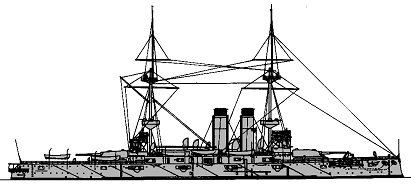
NAVYPEDIA
 Support the project with paypal
Support the project with paypal
Photo

Asahi 1900 Many thanks to Wolfgang Stöhr for additional information on this page.
Ships
| Name | No | Yard No | Builder | Laid down | Launched | Comp | Fate |
|---|---|---|---|---|---|---|---|
| 朝日 [Asahi] | 328 | John Brown, Clydebank, UK | 1.8.1898 | 13.3.1899 | 31.7.1900 | repair ship 4.1923 |
Technical data
| Displacement normal, t | 15200 |
|---|---|
| Displacement full, t | 15374 |
| Length, m | 122.0 pp 126.5 wl 129.6 oa |
| Breadth, m | 22.9 |
| Draught, m | 8.30 |
| No of shafts | 2 |
| Machinery | 2 VTE, 25 Belleville boilers |
| Power, h. p. | 15000 |
| Max speed, kts | 18 |
| Fuel, t | coal 1549 |
| Endurance, nm(kts) | 4000(10) |
| Armour, mm | Harvey nickel steel - belt: 229 - 102, bulkheads: 356 - 152, upper belt: 152, casemates: 152 - 51, deck: 102 - 25, barbettes: 356 - 203, turrets: 254 - 203, CT: 356 sides, 76 roof |
| Armament | 2 x 2 - 305/40 Armstrong G, 14 x 1 - 152/40 Armstrong Z, 20 x 1 - 76/40 Armstrong N, 6 x 1 - 47/40 3pdr Hotchkiss Mk I, 6 x 1 - 47/30 21/2pdr Hotchkiss Mk I, 4 - 450 TT (beam) |
| Complement | 830 |
Standard scale images

Asahi 1900
Graphics
Project history
Ordered under the same programme as the previous class, the Asahi was a virtual repeat of that design, the major visual difference being that she only carried two funnels instead of the three in the previous class. This resulted from a re-arrangemem of the boiler rooms, which still encompassed 25 Belleville boilers. At first the machinery suffered from a number of minor faults and Asahi gained a reputation as a coal eater, but this was subsequently improved and the designed figures achieved. Internally the layout differed from the previous class, the watertight subdivision being improved with a total of 288 watertight compartments.
Ship protection
Main 76.2m belt was 2.5m high, its thickness amidships was 229mm (127mm at lower edge) decreasing consequently to 178 and 102mm near ship ends. It connected with main gun barbettes by 356-152mm bulkheads. Upper 66m belt was 152mm thick and 2.3m high. Casemates had 152mm face and 51mm rear armor. Barbettes had 356mm thickness over and 203mm under main deck. Turrets had 254mm faces, 203mm sides and rears and 102mm roofs. CT had 356mm sides and 76mm roof. 51mm armoured deck over citadel connected with lower edge of main belt by 102mm slopes. It had turtleback form outside barbettes and had 76-51mm thickness.
Modernizations
None.
Naval service
The active participant of the Russian-Japanese war. Badly damaged by Russian mine near Port Arthur 26.10.1904 and was under repair till April, 1905. To the First World War beginning she has become outdated and in 1914 reclassified as gunnery TS. In 1923 she was disarmed and converted to submarine rescue ship and used in this quality till 1938, then served as repair ship and sunk off Vietnam coast by American submarine Salmon 25.5.1942.
Many thanks to Wolfgang Stöhr for additional information on this page.
 HOME
HOME FIGHTING SHIPS OF THE WORLD
FIGHTING SHIPS OF THE WORLD JAPAN
JAPAN CAPITAL SHIPS
CAPITAL SHIPS ASAHI battleship (1900)
ASAHI battleship (1900)
